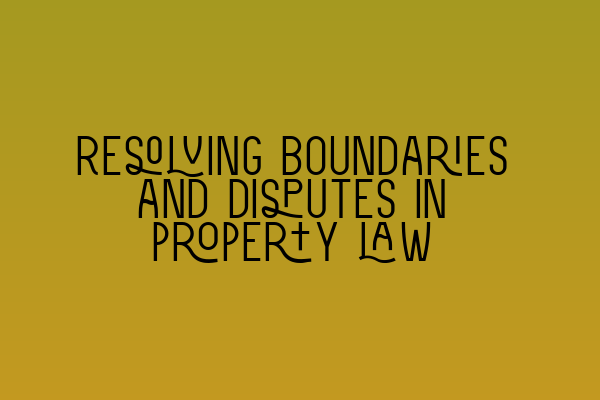Resolving Boundaries and Disputes in Property Law
Property law is a complex and intricate area of legal practice that deals with a wide range of issues related to the ownership, use, and transfer of land and real estate. One common problem that often arises in property law is boundary disputes. These disputes can be an ongoing headache for property owners and can lead to costly lawsuits and strained relationships between neighbors. In this post, we will explore the various aspects of resolving boundaries and disputes in property law and provide insights into how these issues can be effectively resolved.
Understanding Boundary Disputes
A boundary dispute arises when there is a disagreement between neighboring property owners regarding the exact location of their shared property boundary. This can occur due to various reasons, such as inaccurate property descriptions, inconsistent boundary markings, or changes in the natural landscape. Boundary disputes can also arise when one party encroaches onto the other’s property or when there is a disagreement over the rights and responsibilities associated with the boundary.
Resolving boundary disputes requires a thorough understanding of property law, surveying principles, and an effective communication and negotiation skills. It is important to approach such disputes with a calm and rational mindset, as emotions can often cloud judgment and hinder the resolution process.
The Importance of Professional Advice
When faced with a boundary dispute, seeking professional legal advice is crucial. A solicitor who specializes in property law can provide valuable guidance and assistance throughout the resolution process. They will have the expertise to analyze property deeds, survey reports, and other relevant documents to help determine the true location of the boundary.
If a resolution cannot be reached through negotiation and mediation, a solicitor can represent you in court proceedings. They will present the relevant evidence, argue your case, and ensure that your rights and interests are protected. In some cases, it may be necessary to engage the services of a licensed surveyor or other expert witnesses to provide professional opinions.
Alternative Dispute Resolution
In many boundary disputes, pursuing alternative dispute resolution (ADR) methods can be highly beneficial. ADR methods, such as mediation or arbitration, provide a less formal and more cost-effective means of resolving conflicts outside of the courtroom. In mediation, a neutral third party facilitates discussions between the parties, helping them to reach a mutually acceptable solution. Arbitration, on the other hand, involves presenting the dispute to an impartial arbitrator who will make a binding decision.
ADR methods are often preferred by property owners as they allow them to maintain control over the outcome of the dispute, foster better communication between the parties, and often result in quicker resolutions. However, it is important to consult with a solicitor before embarking on any ADR process to ensure that your rights and interests are adequately protected.
Preventing Boundary Disputes
While boundary disputes are a common occurrence, there are several steps property owners can take to prevent such conflicts from arising in the first place. Here are some practical measures to consider:
- Accurate Land Surveys: Conducting a professional land survey to accurately determine the boundaries of your property can help avoid future disputes.
- Clear Boundaries: Clearly mark your property boundaries with physical indicators, such as fences, walls, or boundary stones.
- Effective Communication: Regularly communicate with your neighbors regarding any proposed changes or developments near the boundary line. This can help avoid misunderstandings and potential disputes.
- Reviewing Property Deeds: Thoroughly review your property deeds to ensure that they accurately describe the boundaries and any easements or rights of way.
- Consulting Experts: When making significant changes to your property, such as building extensions or structures near the boundary, consult with professionals, such as surveyors or solicitors, to ensure compliance with legal requirements.
By taking proactive measures and seeking professional advice, property owners can significantly reduce the likelihood of boundary disputes and minimize the associated costs and stress.
Conclusion
Resolving boundaries and disputes in property law requires a combination of legal expertise, effective communication, and a willingness to explore alternative dispute resolution methods. Seeking professional advice from a solicitor who specializes in property law is crucial to navigate through the complexities of boundary disputes and ensure a fair and equitable resolution. By taking preventive measures and fostering positive relationships with neighbors, property owners can minimize the risk of disputes and enjoy a harmonious living environment.
If you have any further questions or need assistance with property law matters, please do not hesitate to contact us at SQE Property Law & Land Law.
Related Articles:
